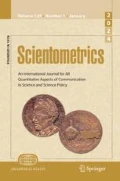Abstract
Salant (J Polit Econ 77(4):545–558, 1969) complained that on many occasions he found the writing of his fellow economists “nearly incomprehensible,” and made suggestions to improve economists’ writing skills (and, by extension, those of natural and social scientists in general). Among other things, he argued that good writers tend to use shorter words. We call this “the Salant hypothesis,” and use standard statistical techniques to test this claim by comparing the average length of words used by Nobel laureates in their banquet speeches. We find that Literature laureates tend to use shorter words than laureates in other disciplines, and the difference is statistically significant. These results support Salant’s idea that words should be used efficiently. This includes using short words instead of longer ones whenever possible. In short, good writing is also “economical writing.”
Similar content being viewed by others
References
Aksnes, D. W. (2003). Characteristics of highly cited papers. Research Evaluation, 12(3), 159–170.
Bottle, R. T., Rennie, J. S., Russ, S., & Sardar, Z. (1983). Changes in the communication of chemical information I: Some effects of growth. Journal of Information Science, 6(4), 103–108.
Bottle, R. T., & Tekfi, C. (1988). Readability of French scientific texts. Journal of Documentation, 44(4), 339–345.
Coelho, P. R. P., & McClure, J. E. (2005). Theory and application: Does complexity crowd out evidence? Southern Economic Journal, 71(3), 556–565.
Debreu, G. (1991). The mathematization of economic theory. American Economic Review, 81(1), 1–7.
Didegah, F., & Thelwall, M. (2013). Which factors help authors produce the highest impact research? Collaboration, journal and document properties. Journal of Informetrics, 7(4), 861–873.
DuBay, W. H. (2006). Smart language: Readers, readability, and the grading of text. Costa Mesa, CA: Impact Information.
Flesch, R. (1948). A new readability yardstick. Journal of Applied Psychology, 32(3), 221–233.
Gallagher, D. J., & Thompson, G. R. (1981). A readability analysis of selected introductory economics textbooks. Journal of Economic Education, 12(2), 60–63.
Gazni, A. (2011). Are the abstracts of high impact articles more readable? Investigating the evidence from top research institutions in the world. Journal of Information Science, 37(3), 273–281.
Hartley, J., Sotto, E., & Pennebaker, J. (2002). Style and substance in psychology: Are influential articles more readable than less influential ones? Social Studies of Science, 32(2), 321–334.
Hartley, J., Trueman, M., & Meadows, A. J. (1988). Readability and prestige in scientific journals. Journal of Information Science, 14(2), 69–75.
Hayden, J. D. (2008). Readability in the British Journal of Surgery. British Journal of Surgery, 95(1), 119–124.
Hemingway, E. (1964). A moveable feast. New York: Charles Scribner’s Sons.
Klare, G. R. (1974). Assessing readability. Reading Research Quarterly, 10(1), 62–101.
McCloskey, D. N. (2000). Economical writing (2nd ed.). Long Groove, IL: Waveland Press.
Metoyer-Duran, C. (1993). The readability of published, accepted, and rejected papers appearing in College and Research Libraries. College and Research Libraries, 54(6), 517–526.
Nieminen, P., Carpenter, J., Rucker, G., & Schumacher, M. (2006). The relationship between quality of research and citation frequency. BMC Medical Research Methodology, 6(42), 1–8.
Okulicz-Kozaryn, A. (2013). Cluttered writing: Adjectives and adverbs in academia. Scientometrics, 96(3), 679–681.
Orwell, G. (1968 [1946]). Politics and the English language. In I. Angus & S. Orwell (Eds.), The collected essays, journalism and letters of George Orwell (vol. 4, pp. 127–140). New York: Harcourt, Brace and World.
Salant, W. S. (1969). Writing and reading in economics. Journal of Political Economy, 77(4), 545–558.
Sawyer, A. G., Laran, J., & Xu, J. (2008). The readability of marketing journals: Are award-winning articles better written? Journal of Marketing, 72(1), 108–117.
Shelley, M. C., & Schuh, J. H. (2001). Are the best higher education journals really the best? A meta-analysis of writing quality and readability. Journal of Scholarly Publishing, 33(1), 11–22.
Sternberg, R. J., & Gordeeva, T. (1996). The anatomy of impact: What makes an article influential? Psychological Science, 7(2), 69–75.
Stremersch, S., Verniers, I., & Verhoef, P. C. (2007). The quest for citations: Drivers of article impact. Journal of Marketing, 71(3), 171–193.
Strunk, W., & White, E. B. (1959). The elements of style. New York: Macmillan.
Sutter, D., & Pjesky, R. (2007). Where would Adam Smith publish today? The near absence of math-free research in top journals. Econ Journal Watch, 4(2), 230–240.
Tekfi, C. (1987). Readability formulas: An overview. Journal of Documentation, 43(3), 257–269.
van Wesel, M., Wyatt, S., & ten Haaf, J. (2014). What a difference a colon makes: How superficial factors influence subsequent citation. Scientometrics, 93(3), 1601–1615.
Zinsser, W. K. (1990). On writing well: An informal guide to writing nonfiction (4th ed.). New York: HarperCollins.
Acknowledgments
The authors would like to thank Luis Pedro La Torre and Evelyn Mayté Milián for valuable research assistance, and an anonymous referee for very helpful comments and suggestions. We have borrowed the expression “economical writing” from McCloskey (2000), though we use it here in a somewhat narrower sense than she does.
Author information
Authors and Affiliations
Corresponding author
Rights and permissions
About this article
Cite this article
Marroquín, A., Cole, J.H. Economical writing (or, “Think Hemingway”). Scientometrics 103, 251–259 (2015). https://doi.org/10.1007/s11192-014-1522-1
Received:
Published:
Issue Date:
DOI: https://doi.org/10.1007/s11192-014-1522-1




